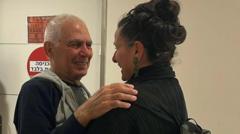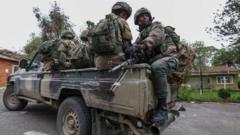UNIFIL is under threat yet vows to continue its vital monitoring and humanitarian efforts along the Israel-Lebanon border.
U.N. Peacekeeping Forces Remain in Southern Lebanon Amid Rising Tensions

U.N. Peacekeeping Forces Remain in Southern Lebanon Amid Rising Tensions
U.N. officials affirm the necessity of UNIFIL's presence, despite Israel's demands for their withdrawal
Amid escalating tensions in the region, U.N. peacekeepers in southern Lebanon, part of the United Nations Interim Force in Lebanon (UNIFIL), have endured increasing assaults from the Israeli military. Despite Israel's repeated calls for their withdrawal, UNIFIL remains steadfast in its mission, as reiterated by spokesperson Andrea Tenenti during a report from Beirut.
Recent attacks have raised concerns regarding the safety of U.N. personnel deployed along the border, where they number approximately 10,000 troops from 50 different nations. Tenenti disclosed that peacekeepers have been deliberately targeted on five occasions since October 10, stating that an Israeli tank even fired upon a UNIFIL observation post, manned by Serbian soldiers, in an incident that resulted in property damage and destroyed equipment.
Despite Israel's claims that UNIFIL serves as a shield for Hezbollah, the U.N. Security Council has unanimously decided that the forces should continue their operations. Tenenti emphasizes the crucial role UNIFIL plays in monitoring regional stability and delivering humanitarian aid to affected civilians in southern Lebanon, where the humanitarian situation has deteriorated.
Additionally, UNIFIL has reported a potential use of white phosphorus munitions near its positions, further complicating the operational landscape. Such weapons are widely condemned and banned from use in populated areas due to severe burn risks.
While Israeli officials deny any intention to target U.N. forces, Tenenti maintains that the evidence points clearly to a pattern of deliberate aggression against peacekeeping troops, raising alarms over the safety of personnel and the potential escalation of the conflict in the region.
Recent attacks have raised concerns regarding the safety of U.N. personnel deployed along the border, where they number approximately 10,000 troops from 50 different nations. Tenenti disclosed that peacekeepers have been deliberately targeted on five occasions since October 10, stating that an Israeli tank even fired upon a UNIFIL observation post, manned by Serbian soldiers, in an incident that resulted in property damage and destroyed equipment.
Despite Israel's claims that UNIFIL serves as a shield for Hezbollah, the U.N. Security Council has unanimously decided that the forces should continue their operations. Tenenti emphasizes the crucial role UNIFIL plays in monitoring regional stability and delivering humanitarian aid to affected civilians in southern Lebanon, where the humanitarian situation has deteriorated.
Additionally, UNIFIL has reported a potential use of white phosphorus munitions near its positions, further complicating the operational landscape. Such weapons are widely condemned and banned from use in populated areas due to severe burn risks.
While Israeli officials deny any intention to target U.N. forces, Tenenti maintains that the evidence points clearly to a pattern of deliberate aggression against peacekeeping troops, raising alarms over the safety of personnel and the potential escalation of the conflict in the region.






















